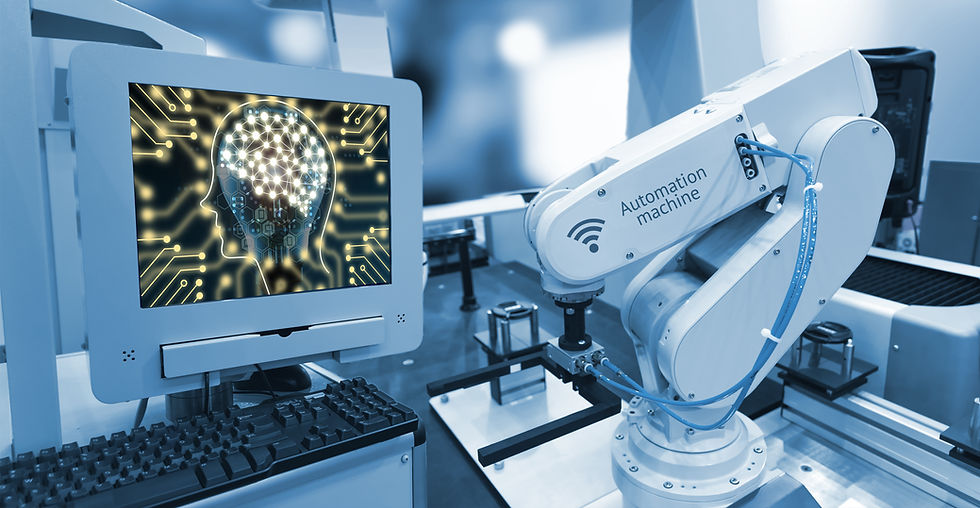Navigating the AI Job Revolution: Embracing Change and New Opportunities
- TinkerBlue Newsroom
- Aug 22, 2024
- 3 min read
As artificial intelligence (AI) continues to advance at an unprecedented pace, its impact on the job market has become a topic of both concern and excitement. On one hand, there are fears of job losses as AI systems take over tasks once performed by humans. On the other hand, there is a growing recognition that AI will also create new roles, requiring a shift in skills and mindset. In this rapidly evolving landscape, how can we navigate the changes and seize the opportunities presented by AI?

The Current Landscape of AI in the Workforce
AI's influence on the workforce is undeniable, with its presence growing across various industries. From automation in manufacturing to AI-driven customer service, machines are taking on tasks that were once the domain of humans. For example, AI-powered chatbots are increasingly handling customer inquiries, while robots in factories are performing repetitive tasks with greater efficiency than human workers.
However, it’s important to note that AI is not just replacing jobs—it’s also augmenting human capabilities, leading to the creation of new hybrid roles. These roles require a combination of human intuition and AI efficiency, signaling a shift towards a collaborative future where humans and machines work side by side.
The Emergence of New Roles
As AI continues to reshape industries, new job categories are emerging, many of which didn’t exist a decade ago. AI specialists, machine learning engineers, and AI ethics officers are just a few examples of roles that are becoming increasingly important in today’s job market. These roles focus on developing, managing, and ensuring the ethical use of AI technologies.
Moreover, the rise of AI has led to the creation of roles where humans oversee and interact with AI systems, ensuring they align with business objectives and ethical standards. For instance, AI operators are responsible for monitoring and fine-tuning AI algorithms to optimize performance, while AI trainers work to improve machine learning models by providing quality data and feedback.
One notable example of this shift is in the healthcare industry, where AI is being used to analyze medical data and assist in diagnoses. While AI systems can process vast amounts of data more quickly than humans, healthcare professionals are needed to interpret the results, make informed decisions, and provide the human touch that is crucial in patient care.
The Skills of the Future
As AI transforms the job market, the importance of reskilling and upskilling cannot be overstated. Workers must adapt by acquiring new skills in areas like data science, AI literacy, and programming. Additionally, understanding how to work alongside AI systems—leveraging their capabilities while applying human judgment—will be a critical skill for many roles.
Despite AI’s growing capabilities, certain human skills remain irreplaceable. Creativity, emotional intelligence, and problem-solving are just a few examples of soft skills that will continue to be in high demand. These skills enable workers to approach problems from unique angles, build meaningful relationships, and adapt to changing circumstances—capabilities that AI cannot replicate.
For those looking to prepare for the AI-driven job market, educational pathways such as courses in AI, machine learning, and data analytics are becoming increasingly valuable. Certifications in these areas can provide a competitive edge and open doors to new career opportunities.
Ethical Considerations and Challenges
As we embrace AI’s potential, it is essential to consider the ethical challenges that come with it. Job displacement is a significant concern, particularly for workers in industries where automation is likely to have the most impact. Additionally, the risk of bias in AI systems and privacy concerns must be addressed to ensure that AI is developed and used responsibly.
Companies have a critical role to play in this transition. By integrating AI responsibly, businesses can not only enhance productivity but also support their workforce through training and development programs. Governments and educational institutions also have a role in preparing the workforce for AI’s impact, ensuring that the benefits of AI are shared broadly across society.
Conclusion
The AI revolution is transforming the job market, bringing both challenges and opportunities. While some jobs will inevitably be displaced, new roles are emerging that will require a combination of technical and human skills. By staying informed, investing in learning, and embracing AI as a tool for growth, we can navigate this change and redefine the future of work.
As we stand at the cusp of this transformation, it is essential to view AI not as a threat but as an opportunity to enhance our capabilities and create a more dynamic and innovative workforce. The future of work, powered by AI, holds the promise of not only increased efficiency but also a reimagining of what’s possible when humans and machines collaborate.
Digitized Product Management: A Guide to Reinventing Your Business Through Digitalization: Daae-Qvale, Agathe: 9781738170500: Amazon.com: Books



Comments